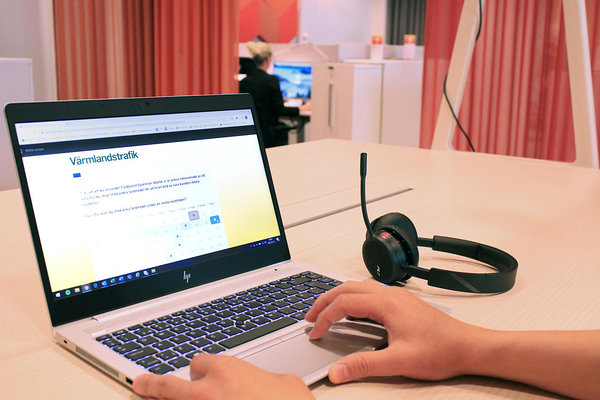Amidst times of change: asking for feedback from public transport users
How does a pandemic and introduction of pilots change passengers’ travel behaviour and perceived accessibility amongst vulnerable groups? RESPONSE partner Värmland Region in Sweden is launching a customer survey to find out. Here's the overview by Sebastian Tay Hannebo from Värmland.
Today, most public transport services outside urban areas, including medical transport, remain focused on providing local, analogue and timetable-fixed bus services. This has resulted in a transport challenge of decreasing passenger volumes and a low level of cost-effectiveness of publicly funded organisations. The RESPONSE project aims to addresses this challenge through taking advantage of crucial societal trends; the open data revolution, digitalisation and demand-orientation. The idea is to explore the untapped potential of demand responsive transport solutions that could provide accessibility, availability and reliability for vulnerable groups in sparsely populated areas.
One further objective of the RESPONSE project is to reduce the number of trips in private vehicles with one passenger and instead promote shared public transport administrated solutions such as seamless trips based on multi-modality and demand-responsive transport (DRT). To try to achieve all this the project partners of RESPONSE has set up 4 pilot initiatives based in Sweden and Norway (Learn more).
However, In the midst of a pandemic and global lockdowns the public transport sector has been hit hard as we have had to assist the battle against the virus with the consequence of little or no ridership. This unfortunately means that all pilots have either been deferred, paused or reduced vastly in size. A restart of all pilots is therefore needed. This does however give RESPONSE a great opportunity to gather a new common baseline through a survey working as a before pilot case, whilst also doing some research into how the pandemic affects peoples’ travel behaviour. Even in a world after the pandemic, public transport is anticipated to be widely affected. Will travellers return to the transport medium seen as less safe than private vehicle transport?
In order to effectively evaluate the pilots,
Region Värmland together with the company Questions & Answers, experts in psychology and
travel behaviour, created a survey that is intended to go live within the
fortnight. It is expected that all RESPONSE pilot areas will conduct the same survey
with only minor alterations maintaining comparability between the different
areas.
The survey in Region Värmland will be administered as a telephone survey as our call centre currently has a lower workload due to Covid-19. As our target group is the vulnerable travellers, we also think it is a good opportunity to offer extra service for our customers by giving them the possibility to ask questions after the survey or simply have a friendly voice to talk to for a while.
One of the most important aspect that the survey will investigate is the users’ perceived accessibility of the transport system. Perceived accessibility is defined as the ease by which an individual can live the life he/she wants with the help of the transport system. The perception of accessibility is much more important in a user focused mindset compared to the objective accessibility. Objectively, there can be routes and traffic all day long, but for some reason our customers still find it inaccessible. This conclusively means that they will not use our services regardless of how many departures we have, and their satisfaction will not be high. Therefore, perceived accessibility is one of the most important aspects that the survey will investigate.
To control the results regarding the Covid-19
situation, questions about perceived safety to use public transport as well as
changes in travel behaviour will also be asked. Trying to find the route to why
people's behaviour has changed together with what is needed for them to return
to use public tansport will become key in understanding the effectiveness of the newly launched pilots.
Finally, the collected survey data will feed into a future executive summary of recommendations. The executive summary aims to provide policy makers valuable evidence-based information that can facilitate/promote coordination of publicly funded services and shared public transport-administrated solutions. For public transport authorities the recommendations aim to focus on costs and benefits of coordinating different publicly funded services and introduce innovative DRT service into the functions of the RPT and allow trips using multiple transport modes. All these objectives are very customer focused as we need to deliver solutions that are based on user needs. Only when we embrace solutions that users truly need can we expect them to ultimately lead to the reduction of the number of trips in private vehicles with one passenger.

